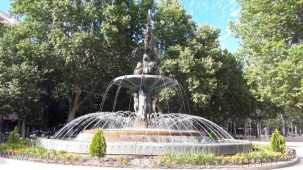
소통을 통해 미래를 준비하는 한국조경이 될 수 있기를

지난 7월 1일. 창간30주년을 맞아 <환경과조경>사의 전
임직원들은 작은 가족행사를 준비하며 30년이라는 시간을
되돌아보고 다시 한 번 새로운 미래를 함께 준비하는 마음을
모을 수 있었습니다. 이 행사를 통해 바쁘게 진행되던
일상에서 잠시 호흡을 가다듬을 수 있었으며, 직원 간
합창연습 등을 통해 늦은 시간까지 연습하면서도 활짝 웃을
수 있었습니다. 아마도 “함께 하고 있고, 그래서 우리는 할 수
있다”는 마음이 서로 통했던 것 같습니다.
올해는 한국에 학문으로서의 조경학이 도입된 지 40년이
되는 해 입니다. “십 년이면 강산도 변한다”는 속담처럼
10년이라는 수치적 시간은 긴 시간의 결절단위로 인식되기에,
한 번쯤은 새로운 변화에 대해 깊이 생각하고 시도하는
계기를 마련하게 됩니다.
생각해보건 데, 한국조경 40년, <환경과조경> 30년이 되는
2012년의 화두는 아무래도 ‘소통’이 아닐까 합니다.
소통의 부재, 세대갈등 등 어느 시대나 있어온 듯 보이는
이 말들이 최근 대두되는 이유는 무엇일까 생각해
보았습니다. 소통을 필요로 하는 현재의 상황은 ‘관계에 대한
갈증’이라는 표현으로 대별할 수 있을 것 같습니다.
‘소통’의 사전적 의미는 “생각하는 바가 서로 통하는 것”이며,
영어의 커뮤니케이션communication은 “서로의 의사가 통하는
것”을 의미한다고 합니다. 여기서 가장 중요한 단어는
‘통通하다’입니다. 서로 간에 통한다는 것은 단지 말과
생각만이 아니고 정서와 느낌, 취향과 행동양식 등 양자
간의 다양성을 모두 포함합니다. 그 다양성 때문에 어쩌면
정작 대화가 필요할 때 많은 이들은 침묵을 선택합니다.
당장의 갈등을 만들기 싫어 침묵을 지키거나 무관심해지는
것이 가장 편하고 빠른 길로 느껴지기 때문일지도 모릅니다.
이러한 개개인의 침묵과 무관심은 집단이기주의를
만들어내는 악순환의 고리가 됩니다.
사회적 소통의 부재는 구성원의 연대를 허물고
집단이기주의에 함께 매몰되어 공공의 목표설정을
불가능하게 합니다. 물론, 개성이 극대화된 현대사회에서
일률적인 목표, 간일한 담론을 모든 구성원이 동의해야
한다는 것은 일종의 폭력일 수도 있고, 다양한 가치와
질서가 공존하는 사회에서 서로의 의견이 다른 것이 지극히
정상적인 것일지도 모릅니다.
하지만, 사회 전체가 아닌 가정 혹은 직장으로 영역을
좁혀서 본다면 구성원들이 함께 바라보는 미래와 비전이
있고, 힘들어도 함께 견뎌낼 수 있는 정이 있습니다.
소통 없이는 불화가 생길 수밖에 없고 그럴경우 마지막
한계에 이르기까지 이를 극복하기 위해 서로 간의 소통을
위한 노력을 하게 됩니다.
하나의 목표를 향해 함께 가고자하는 소통 말입니다.
다행스럽게도 작은 공동체 안에서 같은 꿈을 꾸고 있는
조경분야에는 여전히 관계에 대한 갈증이 세대를 넘나드는
것 같습니다. 이번 8월호에 수록된 3040 집담회에서
가장 많은 키워드로 제기·논의되었던 ‘소통의 부재’는
비단 중견세대만의 갈증이 아니었고, 조경분야 전체의
갈증이었습니다. 선배들이 후배들에게 바라는 것, 후배들이
선배들에게 바라는 것, 설계분야에서 시공분야에 바라는 것,
시공분야에서 설계분야에 바라는 것 등 다양한 스펙트럼의
기대에서 느껴지는 이 상황이 어떻게 보면 아직은 세대 간의
불만이 무관심까지 전개되지 않은 희망적인 상황이라는
생각까지 들게 합니다. 거대화되고 삭막해져가는 현실에서도
조경분야는 열정이 있는 청년의 나이이기 때문인지,
자연을 다루는 서정적인 분야이기 때문인지 아직까지는
서로에 대한 기대나 함께 바라볼 수 있는 비전을 놓지는 않고
있나 봅니다.
<환경과조경>은 30주년을 맞아 ‘3040 집담회’를 시작으로
연속기획 ‘한국조경의 오늘을 진단하다’를 통해 소통의
부재와 함께 제기된 다양한 문제들에 대해 세대를, 공간을
넘나드는 많은 조경인들의 적극적인 고민과 생각을 모아
실천적인 대안을 모색하며, 이를 통해 세대간, 분야간
소통의 실마리를 풀어보고자 합니다.
다시 한 번 묻고 싶습니다.
우리는 서로 소통하고 있습니까?
우리는 서로 이해하고 있습니까?
우리는 서로 존중하고 있습니까?
그래서 우리는 서로 인정하고 있습니까?
July 1, every employee of “Environment & Landscape
Architecture” gathered together and prepared for a
celebrating event, looking back on the 30-year history
of the company and envisioning its bright future. This
gave us a precious opportunity to carve out a moment
for catching our breath and laugh a lot together having
choir practice until late in the evening. We must have
shared a feeling that we could do anything now that we
were standing there side by side with one another.
It has been 40 years since landscape architecture was
rst introduced to Korea as a eld of study. Countless
changes could occur for a single decade of time. It’s
been four decades, and it is time to think of some new
changes that the future has in store for us.
I believe that the major talking point in the industry is,
after all, communication.
I’ve been trying to nd a good reason why
communication has become such an important
conversation topic these days; in fact, we’ve always
talked about lack of communication, generational
conict, and so fourth. In my opinion, we are now living
in a society where people are ‘thirsty for a relationship.’
To communicate, you share or exchange information
with others, which means that you speak the same
language with them and strive to make yourself
understood. In this case, understanding is not only
about words and ideas, but also emotions and feelings,
and tastes and behaviors. Respecting diversity is the key
to successful communication. Ironically, a number of
people decide to become silent because of this diversity,
even when they really need to speak up. It seems they
choose to do so, feeling that it’s the best and easiest
way in order to avoid creating conicts. We could be
locked in a vicious circle, where silence and indifference
produce collectivism.
Lack of effective communication in a society is likely to
break the bond among its members, create collectivism,
and prevent the social discussion of a common cause.
Of course, it is true that there are a variety of ideas and
opinions and we should respect every one of them. It
can be considered highlyabsurd to force individuals to
agree to a single objective or follow a common goal.
However, within the family and the workplace, we have
a similar vision for the future and a deep affection for
each other that help us go through hard times. Without
communication, there is a conict. We do our best to
overcome this conict through communicating more
effectively with one another. This communication is all
about going together to achieve a goal that we have set.
Fortunately, in the landscape architecture industry
where a relatively small number of professionals
share a not much different vision for the future, ‘thirst
for communication’ is not limited to a particular
generation. In the open forum covered in this month’s
issue, various topics were ingenuously discussed by
both seniors and juniors. I was relieved to see that
generational conict had not yet led to indifference to
each other. I could even have a hopeful outlook. It might
be because the industry is still in its developing stage or
because our job is to deal with nature in a rather lyrical
way. Whatever the reason is, it is a good thing to tell we
still have expectations for one another and share the
same dream for the days to come.
“Environment & Landscape Architecture” will continue
to listen to diverse ideas and opinions from those
working in the industry and try to nd practical solutions
to the problems that have been continuously discussed,
including lack of communication.
Now please think about these questions again.
Do we communicate with each other?
Do we understand each other?
Do we respect each other?
So, do we appreciate each other?
- 백정희 · 환경과조경 편집장
-
다른기사 보기
elabaek@gmail.com




















